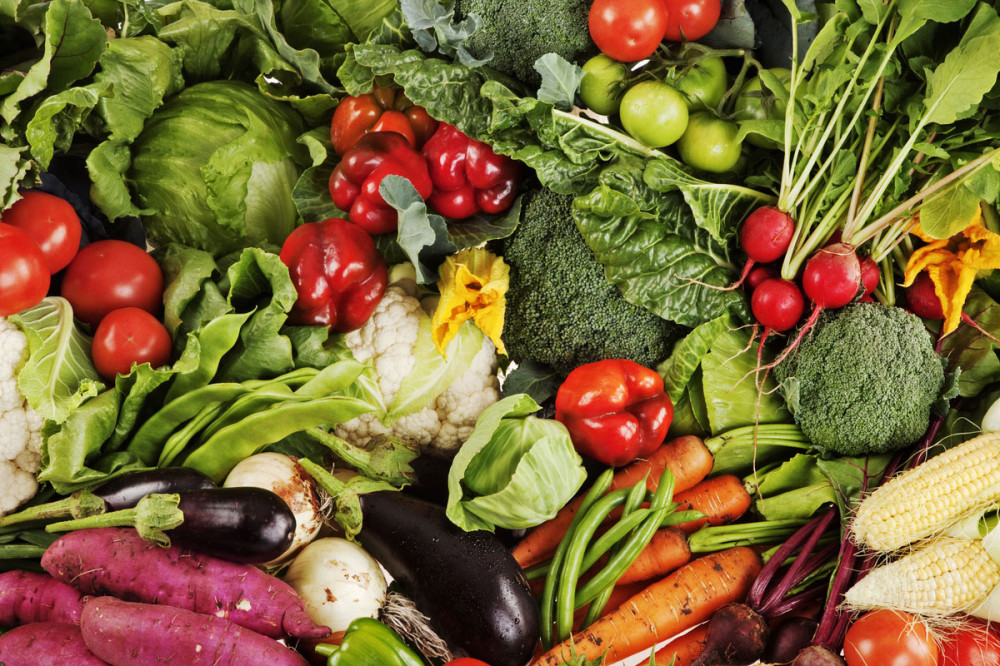- The global food system is one of the primary drivers of biodiversity loss
- Global shift toward healthier, more sustainable diets will help us combat climate change, reduce biodiversity loss, improve human health
- WWF’s Sustainable Diets experts share top tips on what’s good for your health and the planet
 |
| © Kelly Sillaste Getty Images |
Our global food system is one of the primary drivers of biodiversity loss, with agriculture alone being the identified threat to 22,500 of the 41,000 species at risk of extinction.1 Food production is not only the greatest cause of wildlife loss, but it also contributes to climate change: about a quarter of global greenhouse gas emissions are associated with food. And with the world’s population set to reach more than 9 billion by 2050, it is clear that our food system needs to change – urgently.
On World Food Day, WWF reminds us that a global shift toward healthier, more sustainable diets will help us combat climate change and food insecurity,2 reduce biodiversity loss,3 improve human health,4,5 significantly reduce premature mortality,6 and help decrease the risks of future pandemics.7,8
“What we eat matters. It matters to our own health and to our planet’s health as our food choices shape food systems - what is being produced, how and where. Transforming these food systems to sustainable and resilient ones will help us achieve progress on most of the Sustainable Development Goals, where we live and globally”, says Irene Lucius, Regional Conservation Director of WWF-Central and Eastern Europe. WWF, the global environmental organization has defined several “win-win” consumption patterns that can provide human health benefits and decrease environmental impacts:
Eat more plants
Enjoy more fruit, vegetables and wholegrains. Meat, dairy and egg production is more water, land and greenhouse gas-intensive than plant production. By eating more plants - and less meat, dairy and egg products we reduce the impact of our diet on our planet.
Vary your diet
Eat a variety of foods. Globally we rely on a small range of foods. Seventy-five percent of the global food supply comes from only 12 plant and five animal species. Dietary monotony is linked to a decline in the diversity of plants and animals used in and around agriculture, threatening the resilience of our food system and limiting the breadth of food we can eat. These narrow diets don’t provide enough vitamins and minerals as well.
Waste less food
Nearly 570 million tonnes of the global food waste occurs at the household level.9 This means that we are also throwing away natural resources and money. Avoiding food waste in your home, planning your meals, smart shopping and good storing practices can be of help.
Moderate your meat consumption
Enjoy other sources of protein such as mushrooms, peas, beans and nuts. Reliance on animal-based protein sources puts additional strain on our environment and current agricultural practices are not sustainable in the long term. Approximately 60 percent of the greenhouse gas emission of agriculture is due to animal agriculture. Meat, dairy, and egg production is more water, land, and greenhouse gas-intensive than plant production. It does not mean we will go without protein, as it is found in many plant sources.
Eat certified foods
There are various standards you can find on food packets that make sure our food is sourced and produced sustainably. Logos to look out for next time you are shopping include organic, Rainforest Alliance (for sustainable agriculture), Fairtrade (protecting farmers and workers in developing countries), Freedom Food (animal welfare), MSC* and ASC (Marine stewardship council and Aquaculture Stewardship Council, for seafood), and RSPO (Roundtable for Sustainable Palm Oil).
 |
| © Martin Harvey WWF |
Eat less fat, sugar and salt
Keep food such as cakes, sweets, and chocolate as well as cured meat, fries and crisps to an occasional treat. Choose water, avoid sugary drinks. Cultivation of sugarcane and sugar beet causes soil erosion and is often associated with intensive use of water and pesticides. New sugar plantations are replacing natural habitats, leading to biodiversity decline. More information on how to adopt a planet-based diet can be found on the WWF-CEE platform “Good for you, good for the planet”.
ENDS
Contact details:
Mihaela Popova, Communications Manager, WWF Central and Eastern Europe, mpopova@wwfcee.org
Notes to editor
* WWF believes the MSC needs to commit to and accelerate key reforms so that it can maintain its reputation as the world’s leading fisheries standard and certification system. Here you can find the full WWF statement.
Sources of information
-
IUCN Red List of Threatened Species: https://www.iucnredlist.org/#
-
IPCC. 2019. Climate Change and Land: an IPCC Special Report on climate change, desertification, land degradation, sustainable land management, food security, and greenhouse gas fluxes in terrestrial ecosystems. Intergovernmental Panel on Climate Change. www.ipcc.ch/srccl
-
IPBES. 2019. Summary for policymakers of the global assessment report on biodiversity and ecosystem services of the Intergovernmental Science-Policy Platform on Biodiversity and Ecosystem Services. IPBES secretariat, Bonn, Germany.
-
Global Nutrition Report. 2020. Action on equity to end malnutrition. Development Initiatives, Bristol, UK.
-
FAO, IFAD, UNICEF, WFP and WHO. 2020. The State of Food Security and Nutrition in the World 2020. Transforming food systems for affordable healthy diets. FAO, Rome, Italy.
-
Willett, W., Rockström, J., Loken, B., et al. 2019. Food in the Anthropocene: the EAT-Lancet Commission on healthy diets from sustainable food systems. Lancet 393:447–92.
-
WWF. 2020. Covid-19: Urgent Call to Protect People and Nature. WWF.
-
UNEP and ILRI. 2020. Preventing the Next Pandemic: Zoonotic diseases and how to break the chain of transmission. United Nations Environment Programme, Nairobi, Kenya.
-
United Nations Environment Programme (2021). Food Waste Index Report 2021
About WWF
WWF is one of the world’s largest and most experienced independent conservation organizations, with over 5 million supporters and a global network active in more than 100 countries. WWF’s mission is to stop the degradation of the planet’s natural environment and to build a future in which people live in harmony with nature, by conserving the world’s biological diversity, ensuring that the use of renewable natural resources is sustainable, and promoting the reduction of pollution and wasteful consumption.
As a member of the WWF global network, WWF-CEE exists to promote WWF’s mission across seven countries of Central and Southeastern Europe and the Danube and Carpathian ecoregions. Member organizations include WWF-Ukraine as well as WWF-Bulgaria, WWF-Hungary, WWF-Romania and WWF-Slovakia. www.wwfcee.org


